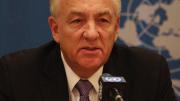Stephen j. rapp ’71 is no longer an assistant secretary of state, but his work to bring international criminals to justice is moving full speed ahead. Based in The Hague, he plays a leading role in the effort to put Syrian president Bashar al-Assad and top officials of his regime on trial for the detention, torture, and murder of tens of thousands of Syrians.
His doggedness comes, in part, from engagement with the victims and survivors. “Their stories, their courage, and their hope energize me to act against those responsible,” he said in a recent interview, and he sees the law as the means to that end. “I can trace it back to Paul Freund’s Gen Ed course, ‘The Legal Process.’ Its message to me was that the law could be a force to protect the weak from the strong.”
Rapp, who served six years, and traveled 1.6 million miles, as ambassador-at-large heading the State Department’s Office of Global Criminal Justice, is confident about the evidence against Assad. Investigators have access to 55,000 photos of detainees’ bodies—hundreds with eyes gouged out—smuggled out by a former forensic photographer who worked at Mezzah military hospital.
Last year, Rapp spent 280 days traveling to help gather the evidence and build support for justice for victims in Syria and other conflict zones. He chairs the Commission for International Justice and Accountability (CIJA), which has amassed three tons of Syrian government records that document the regime’s actions against detained civilians. “They were keeping meticulous records. This is the legal equivalent of a ‘slam dunk,’ ” he states in a 48-minute documentary from Afshar Films, Syria’s Disappeared: The Case Against Assad. The film premiered at the International Film Festival and Forum on Human Rights in Geneva; it includes interviews with former detainees and grieving mothers. Rapp has spoken on panels at numerous screenings in both the United States and Europe.
The Waterloo, Iowa, native practiced law, served in the Iowa House, and was staff director and counsel for the U.S. Senate Judiciary Committee before becoming U.S. attorney for the Northern District of Iowa. His international career began in 2001, when he joined the International Criminal Tribunal for Rwanda (ICTR); he prosecuted the leaders of a radio station and an extremist newspaper for inciting the 1994 genocide, and others involved in the killings, becoming chief of prosecutions in 2005. In 2007, he was named chief prosecutor of the Special Court for Sierra Leone and directed the case against former Liberian president Charles Taylor and others alleged to have violated international criminal law during the civil war in Sierra Leone. Taylor was sentenced to 50 years in prison.
“In the 1990s we saw powerful leaders plan, enable, incite, and order genocide and crimes against humanity in Rwanda, Sierra Leone, and elsewhere,” Rapp noted in the interview. “It was the opportunity to bring those men to face their victims, and to the judgment of law, that led me—at the age of 52—to my life’s work for international justice.”
With Russia blocking referral of Syria to the International Criminal Court, Rapp explained that European domestic courts may provide the best shot at obtaining justice for war crimes committed by Assad and his government. In March 2017 a Spanish National Court judge ordered an investigation into the alleged role of nine Syrian intelligence and security officials in the disappearance and execution of a man in 2013, in what is the first criminal case against Assad’s regime accepted by a foreign court. Later that year, the German federal prosecutor opened a case based on the presence in Germany of multiple survivors and family members of deceased victims of Syria’s torture centers. As Rapp told the Associated Press after that first case was accepted by the Spanish court, “It is the dawn of justice for Syria; it will only get stronger after this point.”









